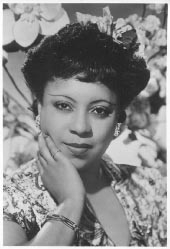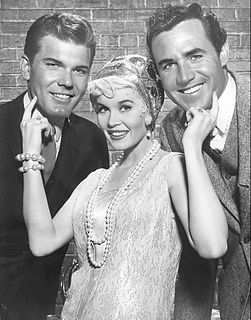Nathan Glantz was an early 20th-century American jazz bandleader. [1]
Contents

Nathan Glantz was an early 20th-century American jazz bandleader. [1]

Nathan Glantz and His Orchestra had a number of aliases. [2] The orchestra produced many recordings, [3] including the following compositions:
Ray Henderson was an American songwriter.

Lew Brown was a lyricist for popular songs in the United States. During World War I and the Roaring Twenties, he wrote lyrics for several of the top Tin Pan Alley composers, especially Albert Von Tilzer. Brown was one third of a successful songwriting and music publishing team with Buddy DeSylva and Ray Henderson from 1925 until 1931. Brown also wrote or co-wrote many Broadway shows and Hollywood films. Among his most-popular songs are "Button Up Your Overcoat", "Don't Sit Under the Apple Tree", "Life Is Just a Bowl of Cherries", "That Old Feeling", and "The Birth of the Blues".
Georgia Gibbs was an American popular singer and vocal entertainer rooted in jazz. Already singing publicly in her early teens, Gibbs first achieved acclaim in the mid-1950s interpreting songs originating with the black rhythm and blues community and later as a featured vocalist on a long list of radio and television variety and comedy programs. Her key attribute was tremendous versatility and an uncommon stylistic range from melancholy ballad to uptempo swinging jazz and rock and roll.

Lemeul Eugene Lucas, better known by his stage name Gene Austin, was an American singer and songwriter, one of the first "crooners". His recording of "My Blue Heaven" sold over five million copies and was the largest selling record of all time. His 1920s compositions "When My Sugar Walks Down the Street" and "The Lonesome Road" became pop and jazz standards.

Aarre Merikanto was a Finnish composer.

Florence Mills, billed as the "Queen of Happiness", was an American cabaret singer, dancer, and comedian known for her effervescent stage presence, delicate voice, and winsome, wide-eyed beauty.

Adelaide Louise Hall was an American-born UK-based jazz singer and entertainer. Her long career spanned more than 70 years from 1921 until her death and she was a major figure in the Harlem Renaissance. Hall entered the Guinness Book of World Records in 2003 as the world's most enduring recording artist having released material over eight consecutive decades. She performed with major artists such as Art Tatum, Ethel Waters, Josephine Baker, Louis Armstrong, Lena Horne, Cab Calloway, Fela Sowande, Rudy Vallee and Jools Holland, and recorded as a jazz singer with Duke Ellington and with Fats Waller.
Alexander Emil Caiola was an American guitarist, composer and arranger, who spanned a variety of music genres including jazz, country, rock, and pop. He recorded over fifty albums and worked with some of the biggest names in music during the 20th century, including Elvis Presley, Ray Conniff, Ferrante & Teicher, Frank Sinatra, Percy Faith, Buddy Holly, Mitch Miller, and Tony Bennett. During World War II Caiola played with the United States Marine Corps 5th Marine Division Band that also included Bob Crosby. Caiola served in the Battle of Iwo Jima as a stretcher bearer.
"Bye Bye Blackbird" is a song published in 1926 by Jerome H. Remick written by the American composer Ray Henderson and lyricist Mort Dixon. It is considered a popular standard and was first recorded by Sam Lanin's Dance Orchestra in March 1926.

The Roaring 20's is an American drama television series starring Rex Reason, Donald May and Dorothy Provine that was broadcast by the American Broadcasting Company (ABC) from October 15, 1960, until January 20, 1962.

"I Can't Give You Anything but Love, Baby" is an American popular song and jazz standard by Jimmy McHugh (music) and Dorothy Fields (lyrics). The song was introduced by Adelaide Hall at Les Ambassadeurs Club in New York in January 1928 in Lew Leslie's Blackbird Revue, which opened on Broadway later that year as the highly successful Blackbirds of 1928, wherein it was performed by Adelaide Hall, Aida Ward, and Willard McLean.

The Three X Sisters were an American all-girl harmony singing trio, initially known as The Hamilton Sisters and Fordyce. They were on stage singing together as early as 1922, and formed their trio in 1924, which was composed of Pearl Santos and Violet Hamilton from Cumberland, Maryland and Jessie Fordyce from Brooklyn, New York. They were known on NBC radio as "radio's foremost harmony trio."

Harry Barris was an American popular singer and songwriter, and is one of the earliest singers to use "scat singing" in recordings. Barris, one of Paul Whiteman's Rhythm Boys, along with Bing Crosby and Al Rinker, scatted on several songs, including "Mississippi Mud," which Barris wrote in 1927.

Richard Hageman was a Dutch-born American conductor, pianist, composer, and actor.

Open Fire, Two Guitars is an album by American pop singer Johnny Mathis that was released on January 5, 1959, by Columbia Records on which he opts for guitar and bass accompaniment instead of performing alongside an orchestra. Two new songs are mixed in with covers of popular standards.

The period from the end of the First World War until the start of the Depression in 1929 is known as the "Jazz Age". Jazz had become popular music in America, although older generations considered the music immoral and threatening to cultural values. Dances such as the Charleston and the Black Bottom were very popular during the period, and jazz bands typically consisted of seven to twelve musicians. Important orchestras in New York were led by Fletcher Henderson, Paul Whiteman and Duke Ellington. Many New Orleans jazzmen had moved to Chicago during the late 1910s in search of employment; among others, the New Orleans Rhythm Kings, King Oliver's Creole Jazz Band and Jelly Roll Morton recorded in the city. However, Chicago's importance as a center of jazz music started to diminish toward the end of the 1920s in favor of New York.

Margarete Kupfer was a German actress.

The Bye Bye Blackbirds are an Oakland, California-based indie rock and power pop band, fronted by guitarist and vocalist Bradley Skaught. The San Francisco Chronicle described their work as "British Invasion guitar-pop with a twinge of country and roots," in which "disparate rock influences – '60s rock, '70s power pop, '80s college radio and indie rock – come together for catchy, harmony-laden songs."

"Don't Bring Lulu" is a Dixieland jazz song.
| This article about a United States jazz musician is a stub. You can help Wikipedia by expanding it. |